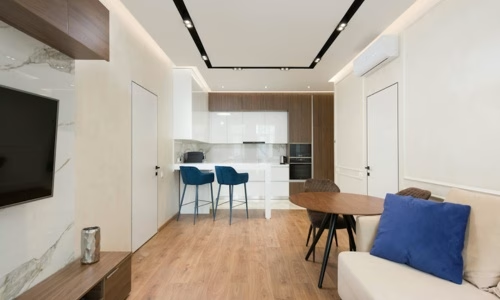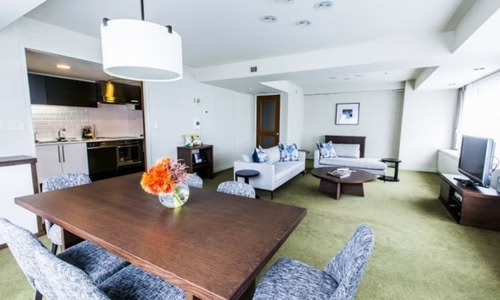Renting an apartment in Tokyo is a dream for many expats and locals alike, but before signing a lease, it’s important to understand both the rental market and the average salary in Japan. In this guide, we’ll explore how housing prices in Tokyo align with Japan’s current income levels, helping you decide where and how to live comfortably in the city.
How Much Does It Cost to Rent an Apartment in Tokyo in 2025?
The price of renting an apartment in Tokyo can differ greatly depending on several key factors such as the apartment’s size, layout, location, building condition, and whether it’s furnished or not. Tokyo’s rental market is vast, catering to a wide range of budgets and lifestyle needs, from compact studio units to spacious multi-bedroom homes for families or group living.
Here’s a closer look at the average monthly rent in 2025:
- Studio or 1K apartments: These small, one-room units are most popular among students, single professionals, and those on a tight budget. Monthly rents typically fall between ¥65,000 and ¥110,000, depending on how close the property is to train stations and central districts.
- 1LDK or 2LDK apartments: Offering separate living areas and bedrooms, these layouts are ideal for couples or small families who need more space. Rents for these types of units usually range from ¥120,000 to ¥220,000 per month, with higher-end units often found in newer buildings or high-demand areas.
- 3LDK or larger apartments: These are suitable for families with children or shared living among working adults. Prices for these homes generally start from ¥230,000/month and can exceed ¥400,000/month in upscale areas with modern amenities.
If you’re interested in a furnished apartment in Tokyo, expect to pay an additional 10% to 20% compared to unfurnished units. While they are more expensive, furnished rentals are a popular option for expats, digital nomads, or individuals planning short-to-medium-term stays who want to avoid the hassle and cost of buying furniture.
Japan’s Salary Landscape: Can You Keep Up With Rent?
When considering a move to Japan, especially to an expensive city like Tokyo, understanding the current salary levels in Japan is absolutely crucial. Income varies significantly based on factors like your profession, age, experience, and whether you’re working full-time or part-time.
In 2025, the average salary in Japan reflects a wide range of earning capacities:
- Median monthly salary (individual): Between ¥300,000 and ¥340,000
- Median household income (annual): Roughly ¥5,000,000 to ¥6,000,000
- Minimum wage per hour: Around ¥1,100, though this differs slightly by prefecture
- Minimum monthly salary (full-time): Typically between ¥170,000 and ¥190,000
- Part-time job salary per month: Falls in the range of ¥80,000 to ¥150,000, depending on the number of hours worked
- Hourly wage for part-time jobs: Generally ¥1,000 to ¥1,300
These numbers provide a general framework, but the cost of living in Tokyo should be weighed against your actual income. The capital offers some of Japan’s highest earning opportunities, particularly in finance, IT, and international trade, but also comes with premium housing and daily expenses.
Best Areas to Live in Tokyo Based on Your Income
Tokyo is a city of contrasts, modern skyscrapers stand beside quiet residential streets, and luxury penthouses sit just a few train stops away from affordable family apartments. Choosing the right place to live depends heavily on your monthly income, lifestyle needs, and whether you’re looking for a foreigner-friendly rental experience.
For High-Income Professionals and Corporate Expats (¥500,000/month and above)
If you’re earning a strong monthly salary or are relocating to Japan through a company-sponsored position, you’ll likely be looking for neighborhoods that offer upscale amenities, easy access to international schools, and proximity to central business districts.
Top choices:
- Minato: Home to embassies, multinational offices, and luxury residences. A top choice for senior executives and foreign delegates.
- Azabu: A quiet yet prestigious area, known for international supermarkets, embassies, and refined living.
- Daikanyama: A stylish, village-like neighborhood near Shibuya, offering boutique shops, cafes, and designer apartments.
These areas often feature furnished apartments, concierge services, and are ideal for long-term rental contracts that accommodate expat needs.
For Middle-Class Workers and Local Professionals (¥300,000–¥400,000/month)
If you’re earning the Japan median salary or slightly above, you’ll find excellent value-for-money options in well-connected but less high-end areas. These neighborhoods are perfect for full-time workers, young couples, and growing families.
Recommended areas:
- Nakano: A residential yet lively neighborhood with great train access and a strong community feel.
- Setagaya: One of Tokyo’s largest wards, offering a suburban vibe with green spaces and family-friendly housing.
- Itabashi: A more affordable alternative to neighboring wards like Toshima or Bunkyo, with solid access to central Tokyo.
Apartments in these locations typically range from 1LDK to 2LDK, suitable for comfortable everyday living without breaking the bank.
For Students and Part-Time Workers (Under ¥200,000/month)
If your monthly income comes from a part-time job or you’re living on a student budget, affordable housing is still possible, though you’ll likely need to consider suburban Tokyo or shared housing options.
Cost-effective living options in Tokyo:
- Nerima: Known for its reasonable rent prices and good rail connectivity to Shinjuku and Ikebukuro.
- Adachi: Offers larger apartments at low prices, perfect for shared houses or families with lower income.
- Hachioji: Located in western Tokyo, ideal for students attending universities in the area and those prioritizing affordability over central location.
These neighborhoods may lack the flashiness of central Tokyo but offer a more relaxed lifestyle and substantial savings on rent.
Areas in Tokyo Ideal for Foreign Tenants
For those searching for a Tokyo apartment for foreigners, choosing a neighborhood that caters to international residents can make the rental process significantly smoother. Look for areas where English-speaking services, bilingual agents, and foreigner-friendly landlords are common.
Popular foreigner-friendly locations:
- Shinjuku: Bustling, diverse, and convenient. Great for nightlife and short commutes.
- Roppongi: A long-time expat hub with a high number of English-speaking residents and international amenities.
- Meguro: A quieter yet trendy area with excellent access to the city and many modern rental options.
These locations often offer long-term rentals in Tokyo tailored for international tenants, and furnished options are more readily available compared to other parts of the city.
How Expats Can Secure Housing in Japan
Renting an apartment in Japan, especially in Tokyo can be a bit overwhelming if you’re unfamiliar with local procedures. For foreigners, the process involves more paperwork and unique requirements compared to many other countries. However, once you understand the steps and prepare the right documents, it becomes manageable.
Valid Visa and Identification
Landlords and agencies will require you to present a valid residence card and passport. Your visa type and expiration date play a key role, especially for long-term leases.

Visa & residence card required
Evidence of Job Status or Regular Earnings
To ensure you can consistently pay rent, you’ll need to show income verification, such as recent payslips, a work contract, or a certificate of employment. If you’re self-employed or a freelancer, a tax statement or bank records might be required instead.
Guarantor Requirement (or Guarantee Company)
In Japan, it’s standard to provide a guarantor, someone who agrees to cover your rent if you’re unable to pay. Most foreigners, understandably, don’t have someone in Japan who can do this, which is why many agencies allow the use of a guarantor company. This service comes at a fee, typically equal to 30–100% of one month’s rent, paid once at the beginning of the lease.
Initial Move-in Costs
Renting in Tokyo often comes with steep upfront costs, which can total 4–6 months’ worth of rent. This usually includes:
- Deposit (shikikin) – refundable (typically 1–2 months’ rent)
- Key money (reikin) – non-refundable “gift” to the landlord (0–2 months’ rent)
- First month’s rent
- Agent fee – usually 1 month’s rent (plus tax)
Be sure to ask your agent for a cost breakdown before signing anything.
Apartments in Tokyo Suitable for Foreigners
The good news is that more and more landlords and real estate companies are now offering foreigner-friendly apartments in Tokyo. These listings often skip the need for Japanese language fluency, have simplified procedures, and may waive requirements like key money or even the need for a guarantor.
Many furnished apartments in Tokyo are designed with expats and digital nomads in mind. These units come fully equipped with furniture, appliances, and internet service, perfect for short- to medium-term stays or those who want to avoid the hassle of buying furniture. While the rent may be slightly higher, the convenience and flexibility often make it worth the cost.

Foreigner-friendly, furnished, no hassle
Is Living in Tokyo Affordable? Budgeting Tips for Different Salary Levels
There’s no denying it, living in Tokyo is an exciting experience. The city offers endless convenience, cultural diversity, and world-class infrastructure. But for many people, especially those earning a part-time income or working at the minimum wage level in Japan, managing rent and daily expenses can be a challenge.
Housing is often the biggest monthly cost, and without a clear plan, it can quickly take over your budget. However, Tokyo’s rental landscape is broad and flexible, meaning there are still good options available, even on a modest income.

Living in Tokyo on budget
How to Budget Smart When Renting in Tokyo
Whether you’re earning Japan’s median salary of ¥300,000–¥340,000/month or bringing in a smaller paycheck from part-time work, smart planning can make all the difference. Here are some simple but effective ways to stay financially secure while enjoying life in Japan’s capital:
Look Into Various Districts Before Deciding
Rental prices can vary drastically between Tokyo’s 23 wards and suburban areas. While central districts like Shinjuku or Minato might be tempting, areas like Itabashi, Edogawa, or Tachikawa offer more affordable apartments and still have great train access. Think in terms of commute time, not just distance, many suburbs are 25–35 minutes from the city center by train but cost significantly less.
Document and Analyze Your Monthly Costs
Don’t just look at rent, consider utilities, food, transport, phone bills, and health insurance. If rent takes up more than 30–35% of your income, it’s worth downsizing or looking for shared housing. Budgeting apps or spreadsheets can help you keep tabs on where your money is going every month.
Look Into Shared Housing to Save on Rent
If you’re earning Japan’s minimum salary per month or working freelance, living in a shared house is often a smart first step. These options typically come furnished, with lower upfront costs and flexible contracts. You also save on utilities and get the added benefit of social interaction, which is especially helpful for newcomers.
Explore Government or Subsidized Housing
In some cases, lower-income residents may be eligible for municipal housing programs or subsidies, though these often have waiting lists and basic Japanese proficiency may be required. Still, it’s worth checking with your local ward office (kuyakusho) if you’re planning a long-term stay.
A City That Meets All Kinds of Needs
The truth is, Tokyo’s rental market is one of the most diverse in the world. From compact studios to luxury high-rises, from short-term furnished units to affordable long-term homes, there’s a place for every lifestyle and income level.
Even if you’re just starting out in Japan with a part-time job or modest wage, you can absolutely find a comfortable place to live. It may take a bit more research and flexibility, but with careful budgeting and the right tools, living in Tokyo on a budget is more than possible, it’s completely doable.
Conclusion
Whether you’re earning the Japan median salary, working part-time, or starting a new chapter in Japan, Tokyo’s housing market offers something for everyone. With Arealty, you don’t have to face the complexities of Japanese rental procedures alone.
Start your apartment search with Arealty.jp today and find a place that fits your budget, your goals, and your Tokyo lifestyle.






Leave a Reply